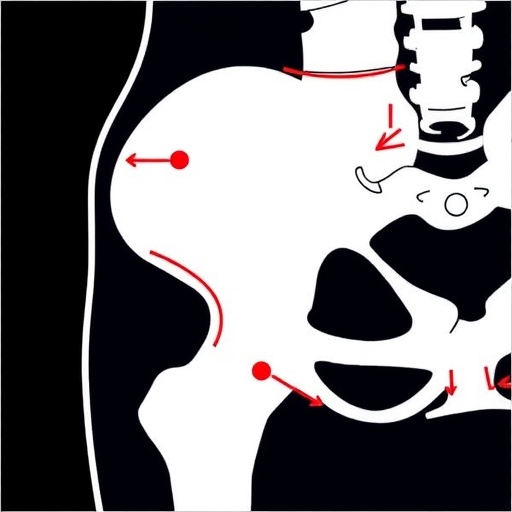Ewing sarcoma is a rare and aggressive form of cancer that primarily affects children and young adults, often arising in the bones or soft tissue. Among the various types of Ewing sarcoma, pelvic involvement constitutes a significant clinical challenge due to the intricate anatomy and the vital structures surrounding the pelvis. As survival rates improve through advanced treatment protocols, understanding the timing of local therapies becomes paramount. New research highlights the profound implications of delayed local treatment in patients with Ewing sarcoma, particularly those with pelvic tumors.
Delay in administering local therapies, such as surgery or radiation, can lead to detrimental outcomes. The review conducted by Yap S.F. and colleagues meticulously analyzes the consequences of such delays, emphasizing a link between timing and patient survival rates. Delayed interventions may allow the disease to progress, potentially leading to metastasis or exacerbating the overall prognosis. This latency becomes a critical factor in treatment planning, as multidisciplinary teams work to balance the need for immediate intervention against the risks associated with an aggressive treatment approach.
The systematic review synthesizes data from multiple studies, providing an evidence-based perspective on how treatment delays affect patients’ clinical outcomes. It becomes evident that timely intervention can substantially curtail disease progression and enhance the chance of a favorable prognosis. The research emphasizes the necessity of swift diagnosis and treatment initiation, which may play a crucial role in improving survival rates among young patients facing this aggressive malignancy.
One of the primary challenges highlighted in this review is the variability in treatment protocols across different institutions. The lack of standardized guidelines often results in discrepancies in the timing of local therapies. This variability can contribute to a delay in optimal treatment initiation and ultimately compromise patient outcomes. Understanding the nuances of treatment timing within various healthcare settings is critical for improving care delivery and patient management.
Moreover, the review identifies key factors influencing treatment delays, including socio-economic barriers, access to healthcare facilities, and the complexity of multidisciplinary decision-making. These factors often intersect, complicating the pathway to timely treatment for many families. Addressing these barriers requires a concerted effort at both the clinical and policy levels to ensure that all patients receive equitable access to the necessary care.
The implications of delayed local therapy reach beyond the immediate clinical outcomes. Research indicates that long-term survivors of Ewing sarcoma may experience chronic health issues due to the aggressive nature of treatments required. Thus, proactive measures to minimize delays could not only improve initial survival but also enhance the quality of life for survivors. The potential to reduce the burden of long-term complications makes the case for re-evaluating treatment timelines even more compelling.
Cancer care today is increasingly multifaceted, with advancements in immunotherapy and targeted treatments providing new avenues of hope. The review underscores the urgency of integrating these innovative therapies as adjuncts to traditional local treatments. Such integration may further mitigate the risks associated with delayed therapies and optimize outcomes for patients with pelvic Ewing sarcoma.
In conclusion, the findings of Yap S.F. and colleagues serve as a clarion call for oncologists and healthcare providers involved in the management of Ewing sarcoma. The emphasis on timely local therapy not only aligns with clinical efficacy but also reflects a compassionate approach to patient care. As the research landscape continues to evolve, ongoing efforts to standardize treatment protocols and improve accessibility will be vital in addressing the challenges posed by this formidable disease.
Future research directions can build on these findings, exploring how telemedicine and digital health solutions might enable faster diagnosis and treatment initiation. Innovative approaches to patient education and community outreach may also help reduce barriers to timely care. Ultimately, fostering a healthcare environment that prioritizes timely interventions could enhance the outcomes for patients grappling with Ewing sarcoma of the pelvis.
In sum, the systematic review sheds light on the pivotal role of timely local therapy in evolving outcomes for Ewing sarcoma patients. It also highlights the urgent need for cohesive strategies to streamline care processes and minimize treatment delays. The insights garnered from this research can serve as a foundation for future clinical practice improvements and patient-centric care modifications.
As the fight against Ewing sarcoma progresses, the findings from this systematic review will undoubtedly contribute to shaping future research agendas. By identifying and addressing the causes of treatment delays, the medical community can improve the trajectory of care for those affected by this challenging malignancy. Through collaboration, innovation, and a unwavering commitment to timely interventions, we can hope to transform the landscape of Ewing sarcoma treatment in the near future.
Ultimately, it will be up to the next generation of oncologists, researchers, and advocates to carry forward the insights gained from this review, working together to eliminate disparities and support the well-being of young Ewing sarcoma patients and their families. With hope and determination, we can strive towards a future where timely local therapies become the norm, ensuring that every patient receives the most effective care without unnecessary delays.
Subject of Research: The impact of delayed local therapy in patients with Ewing sarcoma of the pelvis.
Article Title: A systematic review on the impact of delayed local therapy in patients with Ewing sarcoma of the pelvis.
Article References:
Yap, S.F., Omer, N., Bhadri, V. et al. A systematic review on the impact of delayed local therapy in patients with Ewing sarcoma of the pelvis.
J Cancer Res Clin Oncol 151, 237 (2025). https://doi.org/10.1007/s00432-025-06286-8
Image Credits: AI Generated
DOI:
Keywords: Ewing sarcoma, delayed therapy, local treatment, pelvic tumors, cancer outcomes.




